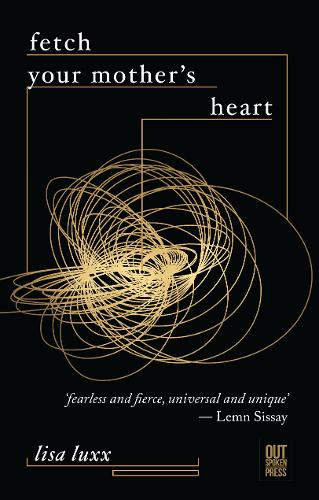Fetch Your Mother’s Heart
lisa luxx,
(Out Spoken Press 2021); pbk £10
In her debut poetry collection, Beirut-based poet lisa luxx expertly captures the essence of violence and destruction lurking in human beings – from intimacy between individuals to the political uprisings of masses. Amidst the chaos of revolution, luxx combines references to Arabic culture and folk legends with the examination of gender and sexual identity. Within a seemingly chaptered structure erupts experimental free verse, showing the defiance of identity and selfhood against attempted political control. luxx’s striking cover presents a tangled mass of yellow rings conglomerating, luring the reader into an interconnected world where cultures link and collide, the individual and nature become one, and the personal indeed becomes the political.
Through all her experimental poetic forms, luxx connects domestic intimacy seamlessly with the suffering and violence of the outer world as a whole. On many occasions, the reader is exposed to two scenes at once. For instance, in ‘majnouneh’ (which is Arabic for a crazy woman) luxx depicts the narrator telling her lover ‘how my salt enters you.’ Yet under this sexually charged scene is a bitter layer depicting the reality happening outside their walls. The narrator does not just ‘dust the salt off your lips’ – she is also breaking down the barriers between the things we desire to keep separate. Right after this line, she says:
& admit
he was found alone, killed
beside a sand dune
gazelle lapping at the salt salt
blood from his wound.
The salt of sexual encounters becomes the salt of spilled blood, thereby forming a distinguishable bond between personal lives and societal uprising. Within the unpredictable terrain of this poetic collection, the narrator is left with nowhere to hide. Everything is exposed, connected, and intertwined in a way that is both beautiful and horrifying.
luxx’s poetry is also beautifully expansive in the way it pushes boundaries and develops character. The poem ‘softness brings you to worlds within the immediate’ perfectly captures her expansiveness. The narrator is ‘barefoot as new beginnings,’ as an ambiguous other woman ‘rubs the soap bar under my fingernails.’ We are given the impression of a baby being bathed by her mother, yet a drastic use of stanza breaking adds a new layer to our interpretation: ‘suds rolling down her ribs.’
Rather than a mother bathing a child, we are now exposed to the image of intimacy between two women. luxx’s staggered and climactic revealment combines the themes of rebirth, growing up, and discovery of identity in the space of a few lines. Yet significantly, these actions happen ‘under an outpour,’ and the narrator hears a song within her own body about ‘someone we stopped searching for’ who is ‘calling out/ for shore.’ Tumultuous external factors threaten every form of intimacy depicted in this collection, and a hint of suffering and isolation always lies beneath the surface. The narrator embodies the desperate pleadings of someone suffering far away, thereby embodying an interconnection between desire, self-discovery, and pain.
Through the poetic portrayal of these themes, luxx ultimately conveys a strong message about generational trauma. One of her last poems, ‘dipping buckets of longing into the well of grief’ is literally shaped like an empty well, describing adults desperately making wishes: ‘news from afar is making its way towards you.’ The next stanza is moulded into the shape of the well’s hole, which describes a young brother protecting his sister. The actions of our generation will affect the next generations – by letting desire express itself through violence, we are negatively impacting the next generation. Whilst luxx does not avoid the inescapable link between desire and violence, and the personal and the political, she at least attempts to challenge this connection.
Overall, this evocative collection stunningly encapsules the dark side of human nature, which overshadows domestic daily life and the discovery of identity. This is an important read for today’s world, to inspire a brighter future instead for the next generation to come.
Orla Davey


Leave a Reply